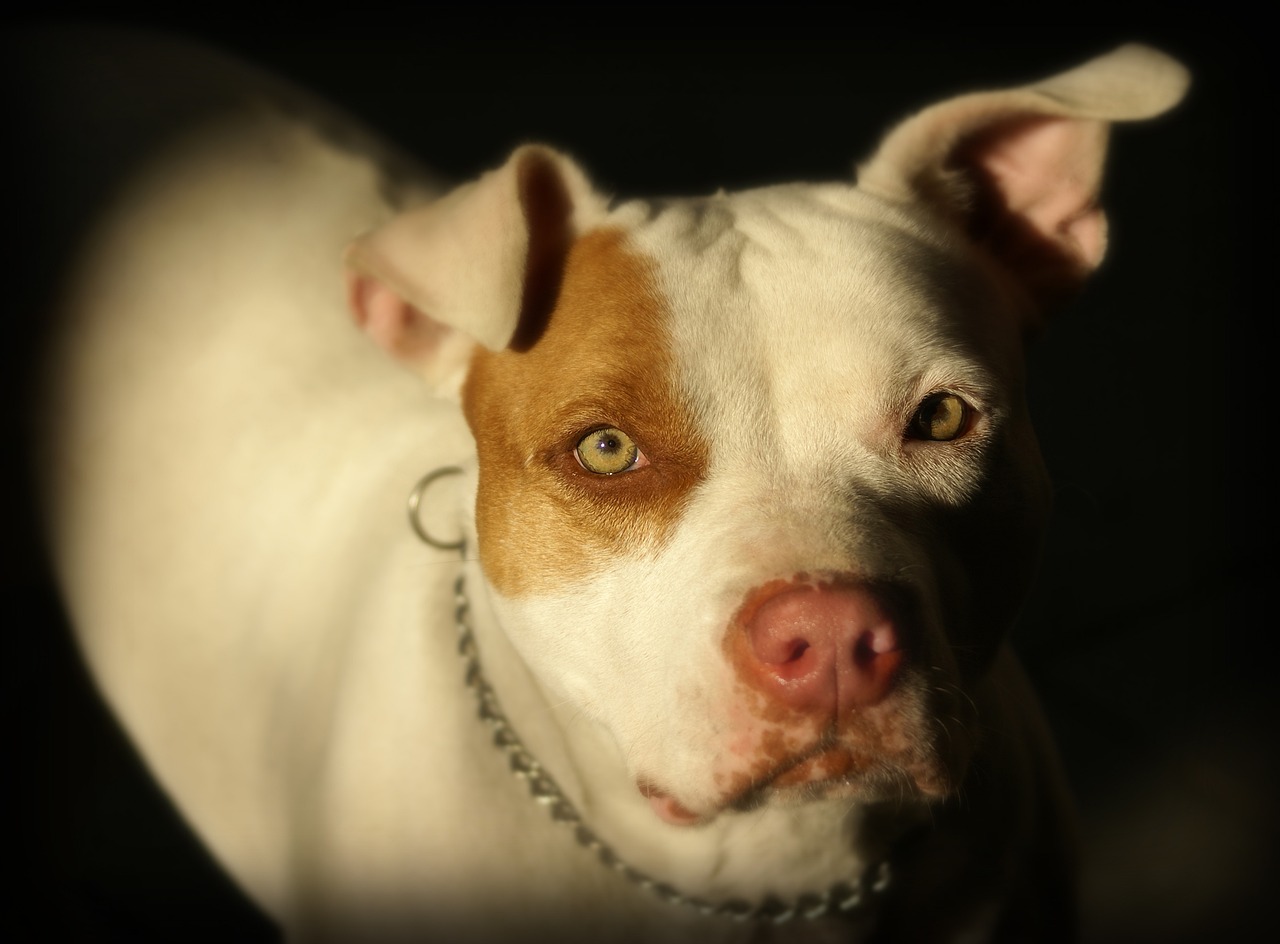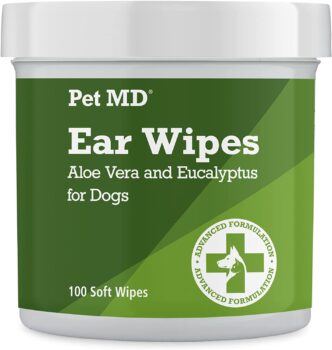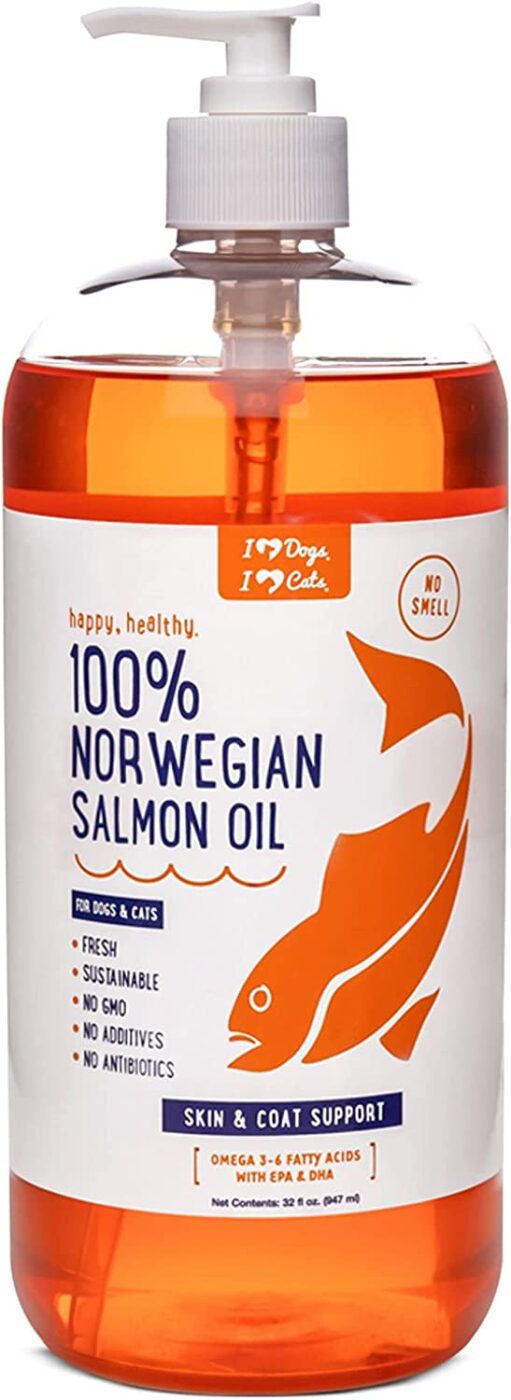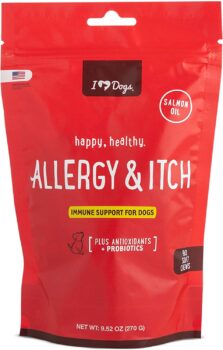Dogs are like family, and like family, we want to make sure they’re healthy and happy. Pit Bulls, known for their strength and loyalty, are susceptible to various health problems, ear infections being one of them. But fear not, this article will walk you through 11 ways to both treat and prevent ear infections in your furry friend. Also, we will specifically talk about the beneficial effects of Omega-3 in their diet.
iHeartDogs is reader supported. Some of the links below may be paid affiliate links, where we receive a small commission on a product at no additional cost to you.
1. Regular Ear Cleaning
Start with regular cleaning of your Pit Bull’s ears. Make it a routine to clean their ears at least once a week. Use a vet-approved ear cleaner that gently removes the debris and wax build-up. Remember to be gentle and never insert anything into the ear canal.
Our favorite ear cleaner is these PetMD brand ear wipes on Amazon.
2. Keep Ears Dry
Pit Bulls love swimming, but the moisture can increase the risk of ear infections. Make sure to dry your dog’s ears thoroughly after they’ve been in the water. You can use a soft, dry towel or an ear dryer specifically designed for dogs.
3. Regular Vet Check-ups
Routine veterinary visits can help in the early detection of ear infections. A vet can professionally clean your Pit Bull’s ears and suggest preventive measures tailored to your dog.
4. Proper Diet
A good diet can significantly help in preventing ear infections. It boosts the immune system, helping fight off bacteria and yeast that can cause infections. Include Omega-3 fatty acids in your dog’s diet; they help reduce inflammation and maintain ear health.
5. Omega-3 Supplements
Omega-3 fatty acids aren’t just beneficial for humans; they’re equally advantageous for dogs. They help combat allergies, which can often lead to ear infections. Omega-3s reduce inflammation, decrease itching, and strengthen the immune response, thereby reducing the likelihood of infections.
We’re fans of this Norwegian salmon oil on Amazon. It’s a bright orangish-pink color and has no fishy smell at all due to it’s ultra high purity.
6. Watch for Allergens
Allergies often cause ear infections in Pit Bulls. Be observant of your dog’s behavior. If they start scratching or shaking their head excessively after exposure to certain environments or foods, consult with your vet about potential allergies.
A few good supplements to help your dog’s allergies are apple cider vinegar, quercetin, and colostrum, all of which are found in many natural allergy supplements like this one.
7. Topical Treatments
If your Pit Bull has a minor ear infection, topical solutions containing hydrocortisone can soothe inflammation and itchiness. Always consult your vet before applying any medication.
8. Oral Antibiotics
In severe cases, oral antibiotics may be necessary. These are usually administered for a few weeks. Always complete the full course of antibiotics to ensure the infection is entirely eliminated.
9. Surgery
In recurrent or severe cases, surgery may be required. Procedures like a Total Ear Canal Ablation (TECA) can help by eliminating the ear canal that harbors the infection.
10. Regular Exercise
Regular exercise helps maintain a strong immune system. It promotes blood circulation, which helps to keep the ear environment less susceptible to infections.
11. Use of Preventive Medications
Several preventive medications can keep ear infections at bay. Consult with your vet about the best options for your Pit Bull.
Now, let’s move to a brief FAQ section addressing common questions about Pit Bulls and ear infections.
FAQs
1. What are the signs of ear infections in Pit Bulls? Common signs include excessive head shaking, scratching, foul odor from the ears, redness, swelling, and sometimes, discharge.
2. Can ear infections in Pit Bulls be chronic? Yes. If the underlying cause isn’t addressed, ear infections can become recurrent and chronic.
3. Are some Pit Bulls more prone to ear infections? Yes. Pit Bulls with allergies or those who frequently swim are more susceptible to ear infections.
4. How often should I clean my Pit Bull’s ears? Ideally, once a week. However, if your Pit Bull swims frequently or has recurring infections, more frequent cleanings might be needed.
5. What should I avoid while cleaning my Pit Bull’s ears? Avoid using cotton swabs, as they can push debris further into the ear. Also, don’t use alcohol or vinegar, as they can cause irritation.
6. Can diet really help prevent ear infections in Pit Bulls? Absolutely! A balanced diet rich in Omega-3 fatty acids can boost the immune system, reducing the risk of infections.
7. What’s the connection between allergies and ear infections? Allergies can lead to inflammation and excess wax production, creating an environment conducive to infections.
8. Can Omega-3 supplements replace other treatments for ear infections? No. While Omega-3 can aid prevention and recovery, it cannot replace vet-prescribed treatments for existing infections.
9. When should I consult a vet if I suspect an ear infection? You should consult your vet immediately if you notice any signs of ear infection. Early treatment is key to prevent complications.
10. Is surgery common for ear infections in Pit Bulls? Surgery is typically the last resort, usually recommended for severe or recurring infections that don’t respond to other treatments.
In conclusion, ear infections in Pit Bulls are manageable and often preventable. Regular ear cleaning, a good diet enriched with Omega-3, routine vet visits, and allergy management are key steps in maintaining your Pit Bull’s ear health. Remember, a healthy dog is a happy dog!




 Toledo, United States.
Toledo, United States.